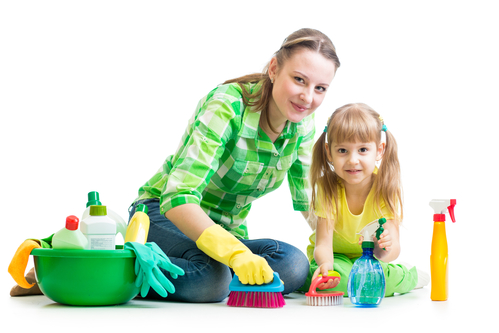10 Toxic Household Items You Should Throw Away Now
Could your choice of shampoo or cookware be harming your health? As a rheumatologist, I am often asked why patients have developed a particular autoimmune disease. I take a holistic view of their illness, so I inquire about the patient’s stress levels, diet and exercise patterns – and any chemicals they may be exposed to. This helps me better understand the role their environment may play in their health.

A growing body of research suggests that chemicals in everyday products may put us at risk for health problems – from infertility and birth defects to certain types of cancer. In fact, the U.S. Centers for Disease Control and Prevention now monitors a total of 298 environmental chemicals that have been found in humans, including many used in consumer products. These chemicals can gradually build up in the body, potentially making you sick.
While it’s impossible to avoid exposure to all environmental chemicals, there are ways to rid your home of many of these potential toxins. Here are 10 items you may want to avoid buying, toss or replace:
1. Plastic food containers
Ever wonder why clear plastic containers turn cloudy after running through the dishwasher a few times? Plastic breaks down over time, and this breakdown can release dangerous chemicals into your food. Many plastic containers are made from chemicals including phthalates, which act as endocrine-disrupting chemicals (EDCs). Switch to glass containers.
2. Prepared foods in plastic containers
You don’t necessarily have to toss these, but don’t heat them up in the plastic. Heating plastic can release chemicals that seep into your food. It’s well worth your time to take a few extra seconds to transfer prepared foods into a glass container before heating them in the microwave.
3. Nonstick pans
Many nonstick pans contain trace amounts of a chemical called perfluorooctanoic acid (PFOA), which has been shown to cause cancer in laboratory animals. The pans’ non-stick lining can scratch or chip off into your food. Instead, use cast iron or stainless steel cookware, and natural, non-stick sprays such as olive oil.
4. Air fresheners
I never allow artificial air fresheners in my home. Anything you breathe in eventually ends up in your bloodstream. Plug-in scents or synthetically scented candles many contain chemicals called phthalates, which have been linked to reproductive problems. Instead, choose candles made with essential oils and fresh flowers to scent your home. Also, try using baking soda and white vinegar as odor absorbers.
5. Perfumes
The one-word ingredient “perfume” can translate to a product containing upwards of 300 chemical ingredients. (Perfume companies won’t release lists of exact ingredients for fear of divulging secrets to their competitors.) Avoid perfumes and colognes or switch to products that are scented with natural oils.
6. Fabric and upholstery protection sprays
Stain blockers essentially create an invisible plastic barrier over your furniture. This plastic will eventually wear off and be released into your home environment. Instead, simply clean stains as necessary rather than trying to prevent them.
7. Cleaning products
Check the labels of cleaning products for chemical ingredients such as phthalates and chemical surfactants. Natural products like baking soda, Borax, soap powder, vinegar, lemon and hot water work just as well without coating your home in toxins.
8. Cosmetics
From shampoo to lipstick, the average American woman applies up to 12 personal care items, and the average man up to six, to their skin each day. That adds up to roughly 126 unique ingredients, according to the Environmental Working Group, a public health advocacy organization. Opt for cosmetics with mineral-based pigments and natural oils. Choose soaps and shampoos free of synthetic fragrances and chemicals such as triclosan, which has been found in animal studies to alter hormone regulation.
9. Antiperspirants
Many antiperspirants use aluminum-based compounds and other chemicals, which are absorbed into the sweat glands. While there are ongoing studies on possible health impacts of antiperspirants, I advise avoiding any chemicals that are absorbed into the body for non-medical purposes. You can find aluminum-free antiperspirants, and there are many chemical-free brands of natural deodorant sticks and sprays that don’t contain parabens and all ingredients with ‘PEG’ in their name (such as PEG-8 and PEG-40 hydrogenated castor oil).
10. Sunscreens with oxybenzone
Research on animals suggests that chemicals in some sunscreens, including oxybenzone, may cause health problems when they penetrate the skin. The safest sunscreens are made from minerals such as zinc oxide and titanium dioxide, but they can be very expensive. In general, avoid aerosol spray sunscreens, which you can accidentally inhale, as well as sunscreens containing chemical ingredients such as oxybenzone, octinoxate, retinyl palmitate (a form of vitamin A), and fragrances.
Beware of ‘Natural’ Ingredients
When you’re looking for safer products, keep in mind that term “natural” means almost nothing in the food and cosmetics industry, as it’s not regulated by the FDA. Instead, look for “organic” labeling, because organic ingredients are federally monitored, and really mean something in the food and cosmetics world.
A good start in finding a safer products for yourself and your home is to avoid items containing parabens or -sulfates (such as sodium lauryl sulfate or sodium laureate sulfate) or items labeled “fragrance” or “parfum.”
Of course, it may not be practical for you to toss all of these items at once. Instead, try swapping out one product at a time with a safer version. Even small steps to minimize your chemical exposures can create a healthier and safer home.

Featured Blogger
Aly Cohen

Dr. Aly Cohen is a board certified rheumatologist, integrative medicine specialist, and environmental health expert specializing in arthritis, immune system disorders and women’s health.
Dr. Cohen received her undergraduate degree at the University of Pennsylvania. She went on to medical training at Hahnemann University Hospital School of Medicine in Philadelphia, and completed her internship and residency in internal medicine at Beth Israel Medical Center in New York City. Dr. Cohen continued her specialist training in rheumatology and autoimmune diseases at Montefiore Hospital/Albert Einstein University Hospital in the Bronx, New York. Dr. Cohen is currently in private practice in Monroe Township, New Jersey. Her practice, that she founded in 2011, Integrative Rheumatology Associates P.C., focuses on both traditional western medical management of rheumatologic ailments, as well as integrative options for total “wellness”, such as biofeedback, acupuncture, cognitive therapy, diet and exercise counseling, environmental toxin counseling, smoking cessation, stress management and sleep evaluations.
In 2012, Dr. Cohen created The Smart Human LLC to educate her colleagues and the community on the potential health issues from exposure to everyday chemicals. Dr. Cohen also works as a writer, interviewer and producer for children and adult health programs on an array of network and cable TV channels. She lives with her husband and two young sons in Cranbury, New Jersey.


















